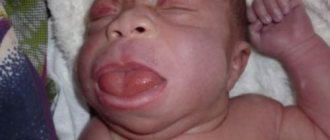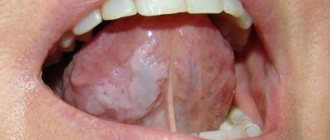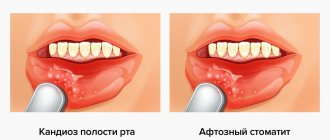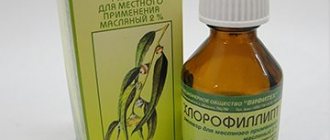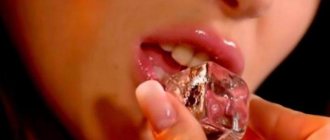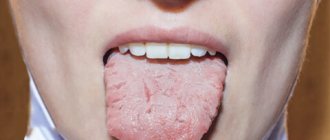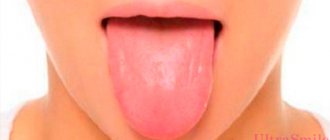Burning tongue. Possible reasons
The causes may be congenital or acquired, associated with infections, intoxications, injuries to the nervous system and disorders of its blood supply, psychogenic, caused by a lack of vitamin PP in intestinal diseases.
A burning sensation of the tongue is often observed with arthrosis of the temporomandibular joint.
Glossalgia can occur with malocclusion, with sharp edges of teeth and dentures, fillings and dentures made of different metals, after traumatic tooth extraction.
Burning syndrome in the mouth is observed in chronic gastritis with secretory insufficiency (reduced gastric secretion), intestinal diseases (enteritis, colitis), and diseases of the liver and biliary tract. Treating these conditions can significantly reduce burning mouth syndrome.
Most often, this syndrome is observed in women aged 50–60 years. The main signs of burning mouth syndrome are the following sensations:
- tingling,
- tingling,
- pressure,
- numbness,
- burning tongue,
In this case, there is a coating on the surface of the tongue and dry mouth.
Causes of Burning Mouth Syndrome
This condition may be associated with any general somatic or dental disease, or it may occur on its own. As a rule, burning mouth syndrome is a condition in which its source is unknown. It occurs spontaneously, and the patient cannot indicate the cause or trigger for the complaint.
There are several theories about the development of this pathology, but none of them have yet been proven. Researchers of this problem have made several assumptions as a theory of the origin of the syndrome. One of the most common is the theory of sex hormone deficiency, since complaints of chronic burning of the tongue are often made by pre- or postmenopausal women. True, when checking studies in this area, reliable statistical significance was not established, but, nevertheless, as a theory, this reason is supported by many practitioners [3].
“Among patients with burning mouth syndrome, women were more common. According to some studies, there were 10.3 times more women with complaints typical of this condition than men.”
Saperkin N.V., Ph.D., Associate Professor of the Department of Epidemiology, Microbiology and Evidence-Based Medicine PIMU [1]
There is an assumption that certain autoimmune processes, especially those that occur in old age, may also be background for the occurrence of burning mouth syndrome [2].
It is possible that this disease occurs in people with neurological or mental disorders, depression. But this is also not the leading theory, since there are studies indicating that it was not depression that led to the onset of the syndrome, but on the contrary, burning mouth syndrome became one of the reasons for the development of a depressive episode. The same spectrum of causes of burning in the mouth includes cancerophobia, especially in people who have quit smoking and are afraid of developing cancer of the lip or tongue, as well as in people with a fear of household transmission of STDs [2].
Injuries can lead to the syndrome, including those not noticed by a person, associated with his habits, congenital or due to pathologies with malocclusion, dental anomalies. Some researchers note that individual changes in the sensitivity and density of the oral mucosa can lead to the development of glossopyrosis. A correlation has been noted between mental lability and increased sensitivity of taste buds: in such people, the incidence of burning mouth syndrome was higher. In general, the approximate list of conditions and diseases in which the syndrome may appear is quite wide [3].
- In women, there is a deficiency of estrogen or progesterone.
- Autoimmune pathology.
- Neurological disorders, PTSD.
- Psychiatric disorders.
- Chronic irritation of the mouth, such as from improper dentures.
- Sensory defects.
Diseases that may cause a burning sensation in the mouth:
- Anemia.
- Parkinson's disease.
- Deficiency of B vitamins, zinc.
- Neuropathy.
- Hypothyroidism.
- Taking medications.
- Diabetes mellitus type 2.
- Sjögren's syndrome with xerostomia.
- Candidiasis of the oral mucosa, esophagus.
- Herpes.
- Cracked tongue.
- Allergies, including contact ones.
- Hiatal hernia.
- HIV.
- Myeloma.
- Oncological diseases [3].
Diagnosis of glossalgia
These sensations can appear at any time of the day, often intensify in the evening, and rarely occur at night. These manifestations may be for no apparent reason, or may occur or intensify after irritating food, the burning sensation may completely disappear while eating non-irritating food. This is an important diagnostic sign of the syndrome.
Burning sensations may be accompanied by swelling of the tongue with tooth marks along its edges, small cracks in the tongue, mild soreness of the tongue and taste disturbances often occur.
Patients may have neuropsychiatric disorders: disorders of the autonomic nervous system in the form of increased heart rate (tachycardia), sweating, pale skin, increased tendon reflexes, obsessive-compulsive neurosis, depression, etc.
The patient is advised to consult specialists: dentist, neurologist, gastroenterologist to exclude glossitis (inflammation of the tongue caused by infection, chemical irritant, injury to the tongue, allergies) and B12 and folic anemia, which causes burning and pain of the tongue with its characteristic changes: bright red, smooth and a shiny (varnished) tongue.
How does burning in the mouth and tongue manifest?
The symptom is clearly noticeable, may occur sporadically and disappear on its own. This happens when taking bitter medicines or eating spicy foods (“fire” in the mouth). A slight irritation of the mucous membrane may bother you after dental procedures; this is quite normal.
True diseases can be assumed if:
- Dryness and burning in the mouth often appear in certain areas of the oral cavity
- Unpleasant sensations intensify and are accompanied by numbness
- The tingling becomes constant
In most patients, the burning sensation manifests itself in the morning, intensifies during the daytime and subsides towards night.
Treatment of burning sensation in the mouth
Therapeutic nutrition, exclusion of spicy and irritating foods.
- After consultation with a dentist, elimination of foci of pathological impulses in the oral cavity from the dentofacial system.
- Normalization of the tone of the autonomic nervous system:
- preparations of valerian, motherwort, bellataminal, etc.,
- tissue metabolism stimulants - courses of B vitamins (B1, B6, B12),
- nootropic drugs, depending on the nature of the neuropsychic disorders (tranquilizers, antidepressants and other drugs that improve blood supply to the brain and oral tissues). The course of treatment must be carried out after consultation with a neurologist.
- Local remedies: applications to the tongue of a 2% novocaine solution, 10% lidocaine solution, rinsing with propolis, herbal infusion.
- In some cases, physiotherapy is used - electrophoresis on the solar plexus and cervical autonomic nodes, hirudotherapy from a specialist.
Reasons that can cause this unpleasant condition:
- In combination with other symptoms, a burning sensation may indicate diseases of the blood and gastrointestinal tract;
- Deficiency of certain vitamins in the body, especially groups A and B;
- Improper oral hygiene;
- An allergic reaction – for example, to certain types of toothpaste;
- Mechanical damage to the mucous membrane by any dental structures, the sharp edge of a destroyed tooth, etc.
- Various infections;
- The tip of the tongue burns when overindulging in spicy food or too hot drinks; alcohol abuse, smoking.
- In addition, pathogenic microbes can cause an unpleasant sensation;
- Often the development of infection is facilitated by a decrease in local immunity caused by mucosal dysbiosis.
Symptoms of a tongue burn
Symptoms depend on the extent of soft tissue damage:
First degree - a burn occurs due to short-term exposure to high temperature tissue. The patient experiences slight redness and swelling of the mucous membrane. Often, a burn condition is provoked by consuming too hot food or liquid.
Second degree – swelling of the mucous membrane, redness, and multiple blisters on the surface are observed.
Third degree - accompanied by tissue death, large blisters, redness of the surface, the organ itself seems to “change its consistency.” As a rule, it occurs due to exposure to gases, liquids at elevated temperatures, or chemical compounds.
The fourth degree is a severe lesion when the tissues are charred. This burn condition is rarely compatible with life.
Treatment of a burn to the oral cavity in a child
According to statistics, a large percentage of patients who turn to a doctor for help as a result of a burn to the mouth or tongue are children. Young patients up to a year and older can unknowingly “taste” household chemicals or alcoholic drinks accidentally left on the table by their parents. Also common causes of burns are eating too hot food.
The mucous membrane of a child’s tongue is more delicate and thin, and therefore requires more delicate handling in case of a burn. For treatment, you must urgently contact a pediatric dentist.
Why your tongue burns: the most common reasons
Fans of spicy food know firsthand how the tongue bakes.
As soon as spicy food touches your tongue, your taste buds instantly react to the pepper. Sometimes this condition is not associated with eating peppered foods. According to statistics, about 1% of people suffer from burning mouth syndrome. This is when the tongue and oral cavity “burn” for no apparent reason. Moreover, when carrying out diagnostic procedures, doctors often shrug their shoulders without understanding the cause of such a symptom.
The most plausible explanation for burning mouth syndrome is the theory of a pathological change in the nerve endings of the tongue. Most likely, the burning sensation on the tongue in this case is a consequence of a change in the polarization of nerve cells. For reasons that are still unclear, burning tongue and oral cavity syndrome occurs 5-7 times more often in women than in men.
In most cases, doctors are still able to determine the cause of this symptom. Let's look at the most common types of diseases and conditions that cause a burning tongue:
- Diseases of the teeth and oral cavity . The most obvious reason is dental pathologies. For example, these are gingivitis, periodontitis, advanced forms of caries and others. The causes of burning and soreness of the mucous membranes of the mouth and tongue are inflammation, which occurs against the background of infection or a non-infectious inflammatory process.
- Action of chemical and physical agents . Inflammatory processes in the oral cavity develop when exposed to chemical or physical aggressive agents. For example, this is gastric juice in gastroesophageal disease, stomach ulcers or vomiting. In this case, the acidic contents of the stomach are thrown into the esophagus and oral cavity, where it has an irritating effect. Some types of treatment, such as chemotherapy or radiation, also have a negative effect on the condition of the oral mucosa.
- Fungal infection of the mouth . A common reason for a burning tongue is a fungus. Typically, this is an infection with yeast-like fungi from the genus Candida. Accordingly, this disease is called candidiasis. It is popularly known as thrush. This name is due to the characteristic external manifestations, namely, a white cheesy coating on the tongue. It is noteworthy that candida are representatives of the normal human flora. A certain amount of these fungi is always found in the mucous membranes and skin. However, as soon as the immune system fails or the balance of microflora is disturbed (for example, when taking antibiotics), the fungus begins to multiply uncontrollably. This is how thrush occurs. In rare cases, oral candidiasis occurs without a white coating on the tongue, but a burning sensation is present.
- Stomatitis . Often a burning sensation of the tongue is observed with aphthous stomatitis. This is a type of stomatitis in which rounded aphthae (or pockets of erosion) form on the tongue. Such formations appear not only on the surface of the tongue, but also on the cheeks, palate and other parts of the oral cavity.
- Allergic reaction . A burning sensation on the tip of the tongue or other parts of it is sometimes triggered by an allergic reaction. Typically, this is a reaction to a food allergen. In this case, you should be especially careful with some exotic fruits. Often it is overseas fruits that become a source of allergens.
- Medicines . The instructions for some medications state in black and white that a burning sensation in the mouth is possible as a side effect. This effect often occurs with blood pressure medications, antidepressants, sedatives, and some antibiotics.
- Diabetes . It is known that high blood sugar levels have a toxic effect on the body. First of all, blood vessels suffer (angiopathy develops) and nerve fibers (neuropathies develop). Diabetic neuropathy sometimes affects the nerve endings of the tongue, resulting in a burning sensation, changes in taste, tingling or numbness. Accordingly, such symptoms are also possible in some neurological pathologies, for example, multiple sclerosis and others.
- Glossitis . A common cause of burning sensation or pain in the tongue is glossitis. These are inflammations of the tongue that occur due to infectious and non-infectious causes. Often the cause of this symptom is the so-called “geographical tongue” or migratory glossitis. In this case, the tongue becomes covered with spots, and its external outline resembles a map of the world.
- Deficiency of vitamins and minerals . A burning sensation in the mouth is also possible due to a lack of certain vitamins and minerals, in particular B vitamins, iron or folic acid. In this case, hypovitaminosis may be caused by various diseases that prevent biologically active substances from being absorbed in the small intestine. For example, this is celiac disease, a disease in which gluten intolerance is noted.
- Other diseases . Soreness and burning in the oral cavity is also possible with some other diseases - autoimmune disorders, scarlet fever, tumors and other pathologies.
Geographic language
